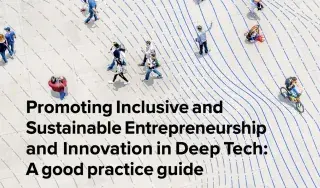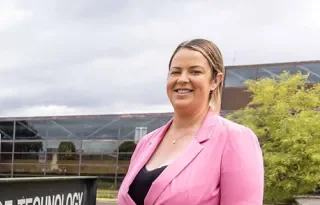Promoting Inclusive and Sustainable Entrepreneurship and Innovation in Deep Tech: A Good Practice Guide
Across Europe, increasing attention is being paid to how higher education institutions (HEIs) can act as “regional innovation engines.” HEIs provide a vital contribution to regional innovation through their education, research and industry-focused activities that collectively support licensing, patenting, and new venture creation. Within these activities, deep tech innovation has become pivotal. This is because cutting-edge technological solutions combining fields of science and engineering in the physical, biological, and digital spheres are now considered to be indispensable in addressing the most pressing global challenges.
Inclusivity and sustainability are also important concepts within the regional innovation agenda. Under-represented groups in society must be guaranteed equal access to opportunities in the field, and pathways that support the achievement of the United Nations’ Sustainable Development Goals (SDGs) must be prioritised.
It was against this backdrop that the EU-funded Start for Future (SFF) project team recently launched their Good Practice Guide - Promoting Inclusive and Sustainable Entrepreneurship & Innovation in Deep Tech.

Led by Professor Colette Henry, Head of Department of Business Studies at DkIT, and supported by a team of co-editors drawn from the SFF consortium, the guide presents sixteen good practice examples in deep tech entrepreneurship and innovation from a selection of European HEIs. Examples are presented across the four main themes of: accredited education programmes (degrees, postgraduate diplomas, masters, PhDs); entrepreneurship training; accelerators/incubators, and other innovative initiatives relating to financial support, diagnostics, and student engagement to promote deep tech entrepreneurship. The examples are drawn from successful initiatives in HEIs in Belgium, Bulgaria, Croatia, Denmark, Estonia, Germany, Ireland, Italy, Latvia, Portugal, Scotland, and Spain.
The collection includes two good practice examples from DkIT – the Post graduate Diploma in Strategic Data Analytics for Business (led by Dr Angela Short in the Department of Business Studies), and the THRIVE4Women project (led by Lavina McGahon and Garrett Duffy at DkIT’s on-campus incubator, the Regional Development Centre).
Professor Henry commented:
“The guidebook has been developed in the form of a free digital e-book. The international good practice examples are presented in an ‘easy to use’ format, with details of impact and key learnings, so that readers can easily adapt the initiatives to their own setting or contact the chapter authors to find out more. We are thrilled that so many HEIs have kindly agreed to share their insights and experiences. This guide should prove a valuable resource for HEIs interested in enhancing their current entrepreneurship and innovation offerings to ensure they are inclusive, sustainable and deep tech focused. It also offers valuable contacts that HEIs can use to enhance their international innovation networks.”
The guide can be downloaded here
For further information, please contact the lead editor, Professor Colette Henry [email protected]



